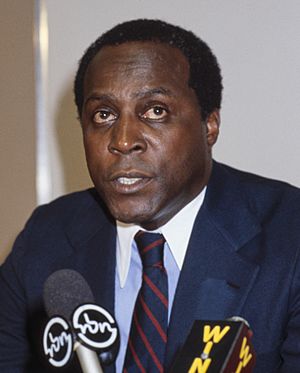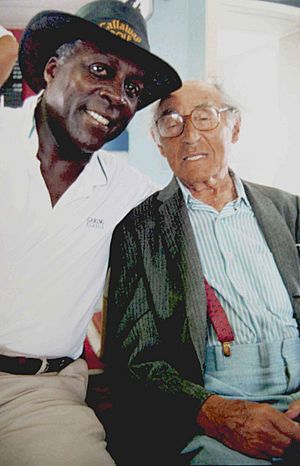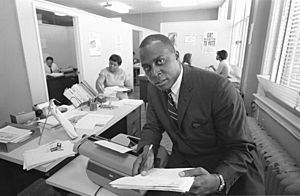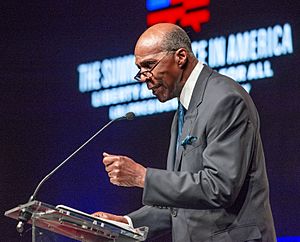Vernon Jordan facts for kids
Quick facts for kids
Vernon Jordan
|
|
|---|---|

Jordan in 1973
|
|
| Born |
Vernon Eulion Jordan Jr.
August 15, 1935 Atlanta, Georgia, U.S.
|
| Died | March 1, 2021 (aged 85) Washington, D.C., U.S.
|
| Education | |
| Occupation |
|
| Years active | 1960–2021 |
| Spouse(s) |
|
| Children | 5 (1 with Yarbrough, 4 by marriage with Ann Cook) |
| Relatives | The Mighty Hannibal (cousin) |
Vernon Eulion Jordan Jr. (born August 15, 1935 – died March 1, 2021) was an important American leader. He was a lawyer and a business executive. He worked hard for civil rights for many years. Later, he became a trusted advisor to President Bill Clinton.
Vernon Jordan grew up in Atlanta, Georgia. He finished college at DePauw University in 1957. In the early 1960s, he began his work in civil rights. He was part of a legal team that helped end segregation at the University of Georgia. Segregation meant that Black and white people were kept separate. He continued to work for many civil rights groups. In the 1990s, he became a close friend and helper to Bill Clinton. He even helped Clinton when he became president. After Clinton's time as president, Jordan worked with many big companies until he passed away.
Contents
Early Life and Education
Vernon Jordan was born on August 15, 1935, in Atlanta, Georgia. His parents were Mary Belle (Griggs) and Vernon E. Jordan Sr. He had one brother named Windsor. His cousin, James Shaw, was a musician known as The Mighty Hannibal.
Jordan grew up in the Southern United States. At that time, there was racial segregation. This meant that Black and white people were kept apart by law. He was a top student at David T. Howard High School. One summer, he wanted to work at an insurance company. But he was turned down because he was Black. Instead, he worked as a driver for a former mayor, Robert Maddox. This helped him pay for college.
He graduated from DePauw University in Indiana in 1957. He was the only Black student in his class of 400. He later earned a law degree from Howard University School of Law in 1960. He was also a member of two fraternities, Omega Psi Phi and Sigma Pi Phi.
Legal Career and Civil Rights Work
After law school, Jordan went back to Atlanta. He joined the law firm of Donald L. Hollowell, a civil rights leader. His firm, along with lawyer Constance Motley, sued the University of Georgia. They argued that the university was unfair in who it let in because of race. In 1961, a court ordered the university to accept two Black students. Their names were Charlayne Hunter and Hamilton E. Holmes. Vernon Jordan personally walked Hunter past angry white protesters. He helped her get to the university's admissions office.
In the early 1960s, Jordan left private law practice. He became more involved in civil rights work. He worked as the Georgia field director for the National Association for the Advancement of Colored People (NAACP). This group works to ensure equal rights for all people. He then worked for the Southern Regional Council. After that, he joined the Voter Education Project. This project helped Black people register to vote.
In 1970, Jordan became the leader of the United Negro College Fund. This organization helps Black students go to college. From 1971 to 1981, he was the president of the National Urban League. This group helps Black people get jobs and housing.
In 1981, he left the National Urban League. He became a legal advisor for a law firm in Washington, D.C.
A Difficult Time
On May 29, 1980, Vernon Jordan was shot and badly hurt. This happened outside a hotel in Fort Wayne, Indiana. He was with Martha Coleman at the time. President Jimmy Carter visited Jordan while he was getting better. This visit was one of the first big stories shown on the new TV channel, CNN.
Working with President Clinton

Vernon Jordan was a good friend and political advisor to Bill Clinton. After Clinton was elected president in 1992, Jordan helped him. He was part of Clinton's team that helped him get ready to take office.
In 1998, Jordan helped a former White House intern find a new job. He also suggested a lawyer for her. His role became part of a big news story. Jordan spoke to a special jury about what he knew. Later, a court did not agree to pay Jordan for all his legal costs related to helping President Clinton with certain issues. He had asked for a lot of money but received only a small amount.
In 1998, Jordan was interviewed on the CBS news TV show 60 Minutes.
Later Activities and Passing
Starting in 2000, Vernon Jordan worked as a senior leader at Lazard Freres & Co. LLC. This is a company that helps other businesses with money matters. He also served on the boards of many large companies. These included American Express, J.C. Penney Corporation, and Dow Jones & Company.
He was also on the boards of companies like Revlon and Xerox. A close friend of Jordan's was Charles Peter McColough, who led Xerox. McColough encouraged Jordan to join the board at Xerox.
In the 2004 presidential election, Jordan helped John Kerry. Kerry was the Democratic candidate for president. Jordan helped him get ready for debates. That same year, Jordan became president of The Economic Club of Washington, D.C..
In 2006, Jordan was part of the Iraq Study Group. This group gave advice on what the U.S. should do in Iraq.
In May 2017, Jordan gave the main speech at the graduation ceremony for Syracuse University.
Vernon Jordan passed away at his home in Washington, D.C., on March 1, 2021. He was 85 years old. He was buried in Oak Hill Cemetery in Washington, D.C.
Marriage and Family
Vernon Jordan first married Shirley (née Yarbrough). She passed away in 1985. They had one daughter named Vickee Jordan Adams. Vickee has worked in public relations for companies like Wells Fargo.
In 1986, he married again to Ann Dibble Jordan. He adopted her four children: Antoinette "Toni", Mercer, Janice, and Jacqueline. He had nine grandchildren in total. Seven of them were from his second wife's children.
Legacy and Honors
- Jordan was a lifelong member of the Council on Foreign Relations. This group studies how countries interact. He was also a member of the Bilderberg Group.
- In 1983, Barnard College gave Jordan its highest award, the Barnard Medal of Distinction.
- In 2001, the NAACP gave him the Spingarn Medal. This award is for great achievements over a lifetime.
- In 2001, his memoir (a book about his life) won an award for Best Nonfiction Book. It was from the Black Caucus of the American Library Association. In 2002, it won an Anisfield-Wolf Book Award and a Trailblazer Award.
- In 2017, Jordan was honored at The New Jewish Home's Eight over Eighty Gala.
- After his death in March 2021, the library at Howard University School of Law was named in his honor.
 | Victor J. Glover |
 | Yvonne Cagle |
 | Jeanette Epps |
 | Bernard A. Harris Jr. |



